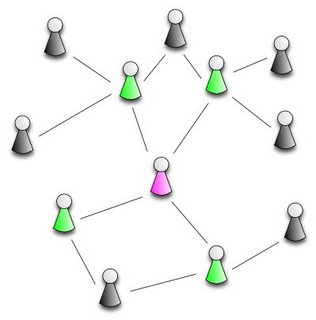Social Networking getting Popular

Sites that link up users in affinity groups are wildly popular.
Sources for this write up: Recent articles in Businessweek. Read them here and here
Are Social Networking group Popular?
You bet!...Here are some stats to prove that
-MySpace,which was said last year to be making profits in the millions of dollars -- has become larger, and according to News Corp.,more profitable.
-LinkedIn, a subscription-based social-networking site for professionals, has turned cash-flow positive after about three years of operation.Last year it grew two to three times in size. It is expected to have 10 million registered users by the end of this year.
-Facebook, a site for students, is now the seventh-busiest spot on the Web..
-Media giant Viacom (VIA) has hired social-networking experts of its own and has even been in talks about a possible acquisition of or investment in Facebook.
-PEERtrainer.com is a social-networking site that creates a buddy system for people who want to lose weight.
-Mobile social-networking holds a lot of promise, too. AirG is geared toward cell phone users. That makes good business sense, according to co-founder Frederick Ghahramani.
What are the popular Social Networking sites?
MySpace and Facebook, where teenagers and young adults trade messages on home pages loaded with photos, profiles, blogs, and more.LinkedIn is a 3-year-old social networking site for grownups(25-to-65-year-old category).
Why is social networking taking off right now?
Co-founder Konstantin Guericke of Linked In: Over the past 10 years, the media have become so noisy; it's hard for advertisers to break through unless they can afford something like a Super Bowl ad. And even companies that can afford them sometimes question whether it's worth it.Word of mouth cuts through all that. That's one reason blogs and social networking are taking off.
How are they running the show?
The companies have attracted major investors. LinkedIn has received venture capital from Greylock and Sequoia Capital, which helped launch companies like Google (GOOG), Yahoo!, Cisco (CSCO) and Apple Computer (AAPL). Facebook raised $12.7 million in venture money from Accel Partners, a backer of Internet music and video player RealNetworks (RNWK).
Are the business models viable over the long-term?
Some experts say the answer is yes. The Internet in general is becoming a more legitimate medium for advertising. "Online rates continue to climb. The cost rose 20% last year," said Jeff Lanctot, general manger of online advertising firm Avenue A/Razorfish.
How are they generating money?
Social-networking sites are attracting a rising number of major advertisers. Most of them come from the entertainment sector, although consumer products companies are active, too .Target (TGT), NBC (GE), and Procter & Gamble (PG ) have run ad campaigns on MySpace.
Social-networking sites have some natural advantages for advertisers, too. Even if the environment can be a bit wild, it creates an opportunity to develop powerful affinity groups and to collect a mother lode of demographic data about its members.
Procter & Gamble used MySpace to launch Secret Sparkle, a deodorant for 16-to-24-year-old girls and women. It linked the product to the home pages of musicians that used MySpace and appealed to the same demographic.When users listened to new songs by The Donnas and Bonnie McKey, they were exposed to ads for Secret Sparkle and offered a chance to participate in a Secret Sparkle sweepstakes.
Any other methods of generating money?
Advertising isn't the only approach to making money in social-networking. Some sites are having some luck with getting users to pay.That's a difficult thing to do on the Web, where information tends to be free. But LinkedIn uses a combination of free access and tiered levels of service that range from $60 to $2,000 a year.
Are you sure that this is not like those dot com days.?
Some believe that this is like the dot-com era. A few companies will get wiped out.
Molly Wood talks about 5 reasons why social networking won't work.
1. There's nothing to do there
2. It takes too much time
3. Traffic alone isn't enough
4. Strangers kind of suck
5. We already have the Internet.
Any conclusion?
The business models for the social-networking market are still evolving. No doubt, plenty of them will fail, providing fodder for jokes that compare them to Pets.com or Friendster, a social-networking pioneer that lost its lead.The rise of social networking has created plenty of comparisons to the Internet bubble of the '90s. For sure, that era had more than its share of losers.But it also created Yahoo, Google, eBay (EBAY), and Amazon (AMZN). It could well be that a few of the next major Internet companies will come from the ranks of social networking.




0 Comments:
Post a Comment
<< Home